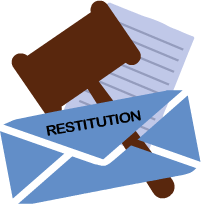The criminal justice process - Restitution hearing

If there is eligible restitution, the court has 180 days from sentencing to order restitution. It’s not uncommon for restitution to be agreed outside of court. If there is some disagreement, then the court will set a restitution hearing. To learn more about what is eligible for restitution visit here.
It is important to note:
- Restitution is only ordered upon conviction. If the case is dismissed, or if the defendant is found not guilty, then no restitution may be ordered.
- Restitution payments are subject to the offender’s ability to pay. The court will not force an individual to pay if they are found indigent.
- The King County Superior Court Clerk’s office is responsible for collecting and dispersing restitution payments. For questions related to payments please visit here.
What is restitution?
In a criminal case, if the defendant is found guilty or pleads guilty, the court may order restitution within 180 days of the sentencing. Restitution can include any out of pocket expenses directly related to the crime such as property damage, medical or counseling expenses, and future medical expenses. Restitution does not cover pain and suffering.
Crime Victims must provide documentation (receipts, invoices, cost estimates, etc.) to the King County Prosecuting Attorney’s office by completing the Victim Loss Form. You can complete this form and submit your documentation online through our website. The type of restitution you can receive and what is covered by law depends on the crime and the charges. Once a restitution order is signed by the court, the defendant is ordered to pay.
- If the defendant makes payments, victims will receive payments.
- If the defendant does not make payments, victims will not receive payments.
- Some defendants may be deemed “unable to pay” due to their economic status, and though the court ordered restitution, victims still receive no payments.
Who do I ask about restitution payments?
If restitution has been ordered by a Superior Court Judge, restitution is then collected and disbursed through the Superior Court Clerk’s Office. For more information from Superior Court Clerk, please contact the Legal Financial Obligations Collections Program at LFOColl@kingcounty.gov. For restitution order in district court, please contact
 Translate
Translate